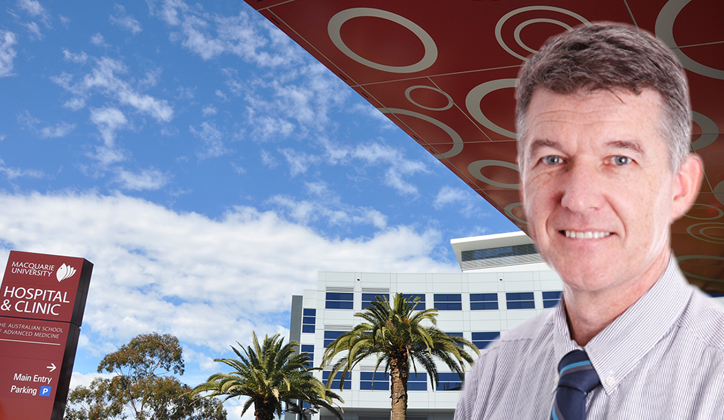Join us in congratulating Professor H Patrick McNeil on his appointment to the role of Executive Dean of Medicine in our new Faculty of Medicine and Health Sciences.
We asked Professor McNeil a number of questions about his academic background, aspirations for the new role and the challenges that lie ahead.
What’s the elevator pitch/layman’s version of your academic background and expertise?
I grew up in Hobart and studied Medicine at the University of Tasmania. After hospital residency, I moved to Sydney to become a specialist in rheumatology (treating people with arthritis and connective tissue diseases). Because many types of arthritis are due to problems with the body’s immune system, I became interested in and undertook a PhD in Immunology at the University of New South Wales (UNSW). Then followed a post-doctoral fellowship at Harvard Medical School in Boston where I discovered new genes expressed by an immune cell called the ‘mast cell’. I returned from Boston to a clinical academic role at UNSW where my research since has focused on understanding the role of mast cells in arthritic diseases.
As a clinical academic over the past 21 years, I have combined research with teaching medical students, and treating patients with arthritis. I spent 12 years at Prince of Wales Hospital and in 2005 took up a chair in Rheumatology at Liverpool Hospital. Whilst at Prince of Wales Hospital, I became very interested in teaching and learning and undertook a Graduate Diploma in Higher Education. My passion for improving student learning led to a leadership role as Associate Dean, Education where we transformed UNSW’s medical curriculum to a highly innovative outcomes-based program that many now regard as one of Australia’s pre-eminent Medicine programs.
In more recent times I joined the leadership team at Liverpool Hospital as the Executive Clinical Director. In this role, I have been working to transform the ways that doctors, nurses and health professionals interact with each other and do their work to ensure patients receive timely, safe and effective care when they require hospital treatment.
Arthritis is a common problem and seriously under-funded and under-recognised for its contribution to overall health burden. I became Chair of Arthritis Australia in 2010 to assist in its mission of advocating for and improving the lives of the 3 million Australian people living with arthritis.
Why did you choose that discipline?
Rheumatology was a relatively new discipline when I was doing my clinical training, at which time the available treatments were limited and doctors were not well trained to care for people with arthritis and related conditions. I thought there was a lot of room for improvement and research in immunology was just taking off. Over my career, medical research has generated a paradigm shift in new treatments for people with types of arthritis that involve inflammation in the joints, for example rheumatoid arthritis. As a result, we now have many highly effective treatments that have revolutionised the way rheumatologists can care for their patients.
What attracted you to Macquarie?
I love being involved in innovation and creativity and believe Macquarie has a great opportunity to construct a unique academic health care enterprise that can drive expansion of health-related research and education programs. Macquarie has a history of being different and challenging tradition and that suits my passion for innovation and improvement. The role requires a focus on research, teaching and clinical care and the opportunity to integrate these three areas of academic scholarship at Macquarie is an attractive prospect.
What do you hope to achieve in the new role?
Building a new Faculty is both challenging and exciting and I would aim to accelerate the research mission, building upon current strengths in the Australian School of Advanced Medicine, and developing partnerships available because of Macquarie’s location and relationships with a biotechnology corridor.
Creation of a precertification Medicine program is a priority that should be considered. If we go that way, I would hope to build a high degree of flexibility and innovation in the design and teaching and learning philosophy of such a program. I will ensure a strong focus on quality in the student experience to attract high calibre students to the Faculty’s pre-certification and post-graduate programs.
My vision for the academic health centre formed by Macquarie University Hospital and the Faculty is the provision of cutting edge clinical care, placing the patient at its focus of its operations with a strong emphasis on quality and safety. It will value its staff, create a learning workplace, and foster a culture of collaboration and inter-disciplinary care. Over time, I see the Macquarie University health care enterprise as being the institution of choice for clinicians and researchers at the top of their fields.
What do you see as the opportunities and challenges for Macquarie in the next 5-10 years?
As an outsider, I need to spend time learning more about Macquarie’s existing strengths before answering this question. However, I see Macquarie as being well placed to navigate the challenges that the entire higher education sector will face in the next decade. Maintaining and increasing educational quality should always be a priority of universities, and I am impressed by Macquarie’s commitment to transformative learning, and emphasis on experiential learning including the PACE program. I believe the research mission improves learning at every level, and I see Macquarie’s research acceleration will provide opportunities for these two components of academia to be increasingly integrated.
Read the Vice-Chancellor’s announcement of the appointment.
Find out more about the new Faculty of Medicine and Health Sciences.

